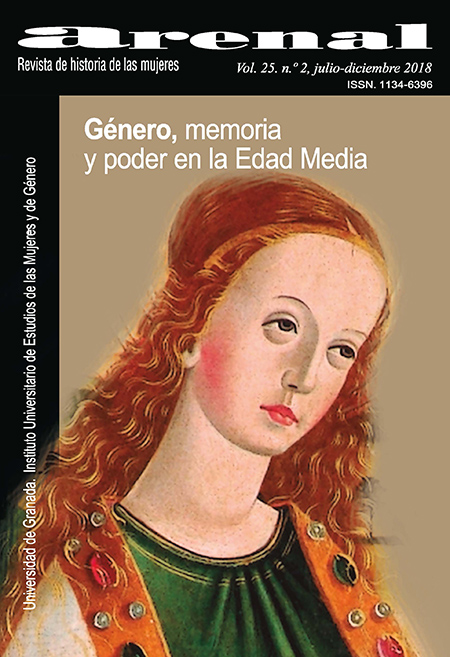“Get liberty and freedome from the Female Slavery”. Margaret Cavendish y los derechos de la mujer durante la Guerra Civil Inglesa
DOI :
https://doi.org/10.30827/arenal.v25i2.5281Mots-clés :
Margaret Cavendish, Bell in Campo, Mujer, Escritura femenina, Esfera pública, Participación políticaRésumé
El presente artículo tiene por objeto analizar el papel de la mujer en la guerra civil inglesa en una de las producciones teatrales más interesantes de la escritora Margaret Cavendish, duquesa de Newcastle (1623-1673): Bell in Campo. La obra reviste especial relevancia por los planteamientos que hace de la participación de la mujer en los conflictos bélicos y, también, por haber servido como elemento propagandístico para las acciones de la soberana Enriqueta María de Inglaterra. El texto, además, incluye una serie de reivindicaciones de índole político y social relativas a la mujer y a su presencia en la sociedad del momento que nos permiten considerar los escritos de la duquesa dentro del primer feminismo inglés del siglo XVII.
Téléchargements
Références
AKKERMAN, Nadine: “The goddess of the household: the masquing politics of Lucy Harrington- Russell, countess of Bedford”. En AKKERMAN, Nadine; HOUBEN, Birgit: The politics of female households. Ladies in waiting across Early modern Europe. Leiden, Brill, 2014, pp. 287-310. DOI: https://doi.org/10.1163/9789004258396_013
BATTIGELI, Anna: Margaret Cavendish and the exiles of mind. Kentucky, The University Press of Kentucky, 1998.
BOYLE, Deborah: “Fame, virtue and Government: Margaret Cavendish on Ethics and Politics”. Journal of the History of Ideas, vol 67, n.º 2 (2006), 251-290. DOI: https://doi.org/10.1353/jhi.2006.0012
CALDERÓN LÓPEZ, María Isabel: “If it be naught: Margaret Cavendish and the performance of Trascendence”. Sederi, VIII (1997), 121-129.
CAVENDISH, Margaret, Bell in Campo.
http://wwo.wwp.northeastern.edu/WWO/view?docId=wwp/cavendish.62m-bell.
xml;query=cavendish;brand=wwo
CORPORAAL, Marguérite: “‘Thy Speech eloquent, thy wit quick, thy expressions easy’: Rhetoric and Gender in Plays by English Renaissance Women”. Enhttp://www.hull.ac.uk/renforum/
v6no2/corporaa.htm
COTTEGNIES, Line; WEITZ, Nancy (eds.): Authorial conquests. Essays on Genre in the writings of Margaret Cavendish. London, Rosemont Publishing & Printing Corp., 2003.
CLUCLAS, Sthepen (ed.): A princely brave woman. Essays on Margaret Cavendish, Duchess of Newcastle. Hampshire, Ashgate Publishers, 2003.
CUDER DOMÍNGUEZ, Pilar: “Re-crafting the heroic, constructing a female hero: Margaret Cavendish and AphraBehn”. Sederi, 17 (2007), 27-45.
D’MONTÉ, Rebecca: “Making a spectable: Margaret Cavendish and ths staging of the self”. En CLUCLAS, Sthepen (ed.): A princely brave woman. Essays on Margaret Cavendish, Duchess of Newcastle. Hampshire, Ashgate Publishers, 2003, pp. 109-126. DOI: https://doi.org/10.4324/9781315192635-7
EZELL, Margaret J.M.: Writing women literary History. John Hopkins University Press, London, 1993. DOI: https://doi.org/10.56021/9780801844324
FIRTH, C.H. (ed.): The life of William Cavendish duke of Newcastle to which is added the true relation of my birth, breeding and life. London, John C. Nimmo, 1886.
GRANT, Douglas: Margaret the First, a biography of Cavendish, Duchess of Newcastle 1623-1673.
London, Rupert Hart Davis, 1957.
LANG BONIN, Erin: “Margaret Cavendish’s Dramatic Utopias and the Politics of Gender”. Studies in English Literature 1500-1900, 40.2 (2000), 339-354. DOI: https://doi.org/10.1353/sel.2000.0014
LUNGER KNOPPERS, Laura: “You shall be our generalless: fashioning warrior women fom Henrietta Maria to Hillary Clinton”. En BAYNES COIRO, Ann; FULTON, Thomas (eds.): Rethinking historicism from Shakespeare to Milton. Cambridge, Cambridge University Press, 2012, pp. 237-256. DOI: https://doi.org/10.1017/CBO9781139226431.016
— Politicizing domesticity from Henrietta Maria to Milton’s Eve. Cambridge, Cambridge University Press, 2014.
MENDELSON, Sara H. (ed.): Margaret Cavendish. Ashgate Critical Essays on Women Writers in England 1550-1700: Volume 7. Farnham, Ashgate Publishing Limited, 2009.
NICHOLSON, Eric A.: “El Teatro: imágenes de ella” en DUBY, Georges; PERROT, Michelle (dirs.): Historia de las Mujeres en Occidente. Vol. 3. Del Renacimiento a la Edad Moderna. Dirigido por FARGE, Arlette, FRAISSE, Geneviève y ZEMON DAVIES, Natalie, Madrid, Taurus, 2006, pp. 320-342.
PASUPATHI,Vimala C.: “Contexts for teaching Margaret Cavendish’s Bell in Campo”. En NELSON, Bonnie; BURROUGHS, Catherine (eds.): Teaching British women playwrights of the Restoration and Eighteenth century. New York, The Modern Language Association of America, 2010, pp. 348-355.
PEACOCK, Judith: “Writing for the brain and writing for de boards: the producibility of Margaret Cavendish dramatic texts”. En CLUCLAS, Sthepen (ed.): A princely brave woman. Essays on Margaret Cavendish, Duchess of Newcastle. Hampshire, Ashgate Publishers, 2003, pp. 87-108. DOI: https://doi.org/10.4324/9781315192635-6
RABER, Karen L.: “Warrior Women in the Plays of Cavendish and Killigrew”. En Studies in English Literature, 1500-1900. Vol. 40, 3 (2000) 413-433. DOI: https://doi.org/10.1353/sel.2000.0030
REES, Emma L.E.: “A well spurn yarn: Margaret Cavendish And Homer’s Penelope”. En CLUCLAS, Sthepen (ed.): A princely brave woman. Essays on Margaret Cavendish, Duchess of Newcatle. Hampshire, Ashgate Publishers, 2003, pp. 171-181. DOI: https://doi.org/10.4324/9781315192635-11
— Margaret Cavendish: Gender, genre, exile. Manchester, Manchester Unviersity Press, 2003.
— “Triply bound: genre and the exilic self”. En COTTEGNIES, Line, WEITZ, Nancy (ed.): Essays on genre in the writings of Margaret Cavendish. Rosemont Publishing & Printing Corp., 2003, London, pp. 23-39.
RIPPL, Gabriele: “Seventeenth century Englishwomen’s autobiographical writings as transgression of social and generic boundaries”. En HOSH-SCHELLHORN, Martina (ed.): Writing women across borders and categories. HallenserStudienzurAnglistik und Americanistik. Münster (2000), 6, 16-35
ROMACK, Katherine; FITZMAURICE, James (eds.): Cavendish and Shakespeare, Interconnections. Hampshire, Ashgate, 2006.
SABAT RIVERS, Georgina: “Compañía para Sor Marcela de San Félix y Sor Juana Inés de la Cruz. Escritoras de allá y de acá”. En MORANT, Isabel (dir.): Historia de las Mujeres en España y América Latina. Vol. II. El mundo Moderno, coordinado por M. Ortega, A. Lavrin y P. Pérez Cantó, Madrid, Cátedra, 2005, pp. 695-726.
STRAZNICKY, Marta: “Private drama”. En LUNGER KNOPPERS, Laura (ed.): The Cambridge companion to Early modern women’s writing. Cambridge, Cambridge University Press, 2009 pp. 247-259. DOI: https://doi.org/10.1017/CCOL9780521885270.018
WHITAKER, Katie: Mad Madge, Margaret Cavendish, Duchess of Newcastle, Royalist, writer and romantic. London, Chatto&Windus, 2003.
WRIGHT, Joanne: “Questioning Gender, War and ‘the Old Lie’: The Military Expertise of Margaret Cavendish”. En SUZUKI, Mihoko: The History of British Women Writing, 1610-1690. Hampshire, Palgrave Macmillan, 2011, pp. 254-269. DOI: https://doi.org/10.1057/9780230305502_15
WYNNE-DAVIES, Marion: “How great is thy change: familiar discourses in the Cavendish family”. En CLUCLAS, Sthepen (ed.): A princely brave woman. Essays on Margaret Cavendish, Duchess of Newcastle. Hampshire, Ashgate Publishers, 2003, pp. 40-50. DOI: https://doi.org/10.4324/9781315192635-3
Téléchargements
Publié-e
Comment citer
Numéro
Rubrique
Licence
Los/as autores/as que publican en esta revista están de acuerdo con los siguientes términos:
Los autores/as conservarán sus derechos de autor y garantizarán a la revista el derecho de primera publicación de su obra, el cuál estará simultáneamente sujeto a la Licencia de reconocimiento de Creative Commons 4.0 BY-NC-ND que permite a terceros compartir la obra siempre que se indique su autor y su primera publicación esta revista.
Los autores/as podrán adoptar otros acuerdos de licencia no exclusiva de distribución de la versión de la obra publicada (p. ej.: depositarla en un archivo telemático institucional o publicarla en un volumen monográfico) siempre que se indique la publicación inicial en esta revista.
Se permite y recomienda a los autores/as difundir su obra a través de Internet (p. ej.: en archivos telemáticos institucionales o en su página web) antes y durante el proceso de envío, lo cual puede producir intercambios interesantes y aumentar las citas de la obra publicada. (Véase El efecto del acceso abierto).














